As we know, information is the driving force in the world, so reliable sources are vital. People often search for answers online, whether it’s sports tips, drink recipes, or startup solutions. But how much can we trust what we read? The concept of E-E-A-T can assist us. It’s a fundamental factor by which Google assesses the quality of content.
In this comprehensive article, we’ll explain in simple words the essence of EEAT meaning, why it’s crucial for creating quality content, and how this approach affects your site’s visibility in search engines. As a result, you’ll discover how to become an authority in your industry and gain the trust of your audience.
What does EEAT stand for?
Do you know the EEAT meaning? It is about experience, expertise, authoritativeness, and trustworthiness. It is essential to understand that these are the critical principles that Google employs to evaluate the quality of content on websites. They aim to guarantee that users receive only reliable, relevant, and valuable information.
The concept of E-A-T first appeared in 2014 in Google’s Search Quality Rater Guidelines, a document that explains how to rate the quality of search results. These Google EEAT guidelines play a significant role in ranking pages in search results. Google wants to make sure that the content that gets to the top results is trustworthy. Website owners and content creators need to understand EEAT meaning and how to work on improving it.
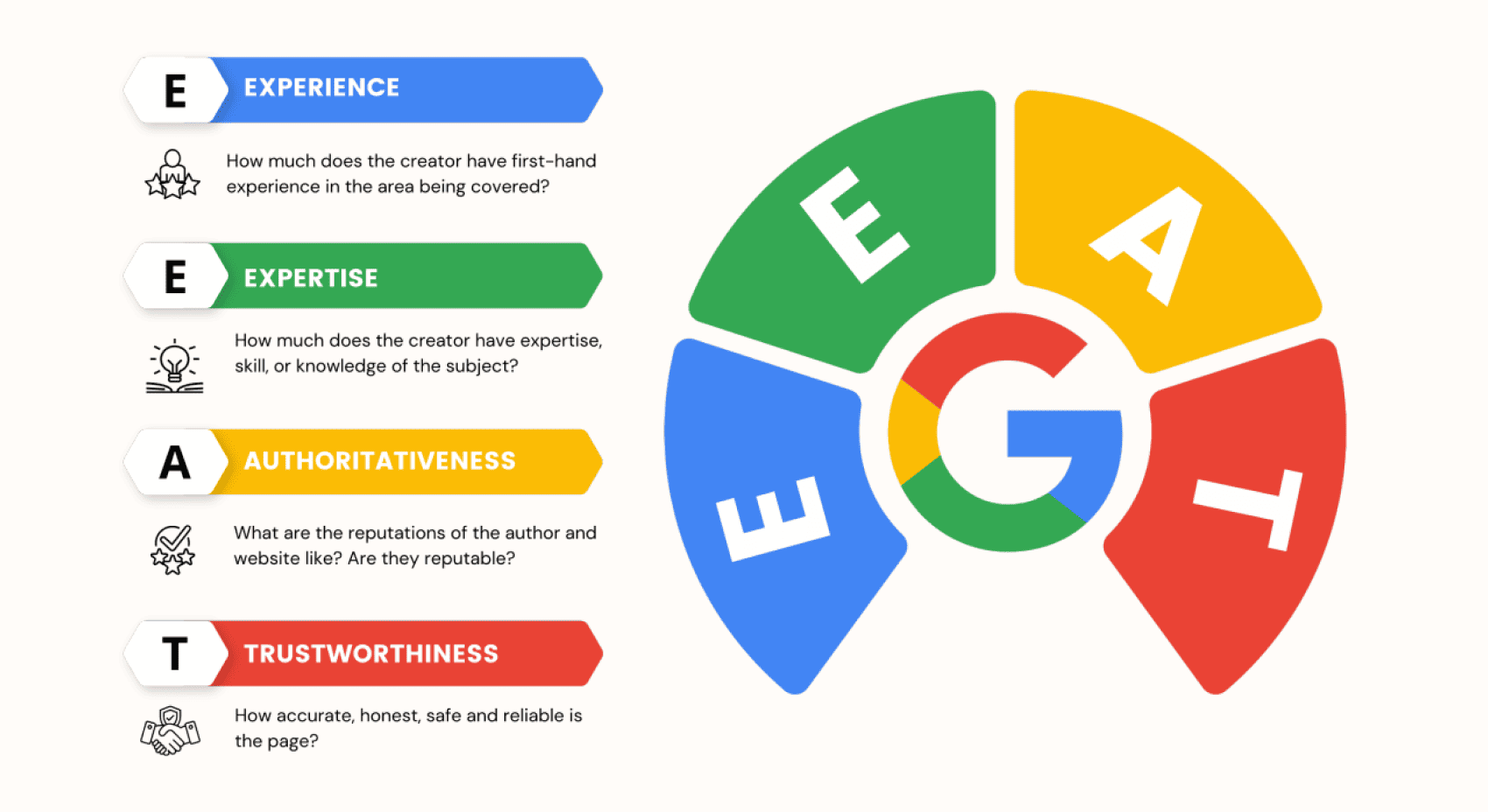
Let’s take a closer look at each component of E-E-A-T:
Experience
This element appeared in 2022, supplementing the previously known E-A-T model. This was a reaction to increasing user demands for content created by people with practical experience in a particular field. By adding an experience element, Google EEAT has strengthened its ability to evaluate “what is written” and “who wrote it and for what goal.”
Expertise reflects the extent to which the content author has helpful knowledge or real-world experience in their topic. For instance, an article about a travel itinerary written by a traveler who has visited the destination is more valuable than a text created without personal experience.
Expertise
To evaluate the level of expertise, Google EAAT guidelines cover the content creators’ biographies, education, and professional backgrounds. If the content is created by professionals with relevant qualifications or experience, this material increases the chances of ranking high.
Authoritativeness
Authority is determined by backlinks from other authoritative sources, media mentions, partnerships with other big brands, or participation in important events. The more authoritative sites link to your content, the higher your authority.
Trustworthiness
Trust is assessed through technical aspects of the site, including SSL (Secure Sockets Layer) certificates, privacy policy, and the absence of malware. It is also important that the site has positive reviews and a good reputation among users.
Why is E-E-A-T so important?
Do you know the E-E-A-T concept has become a critical tool for web admins, SEO (search engine optimization) specialists, and content marketers? Its implementation enhances SEO EEAT indicators, ensures effective audience interaction, and builds long-term relationships with users.
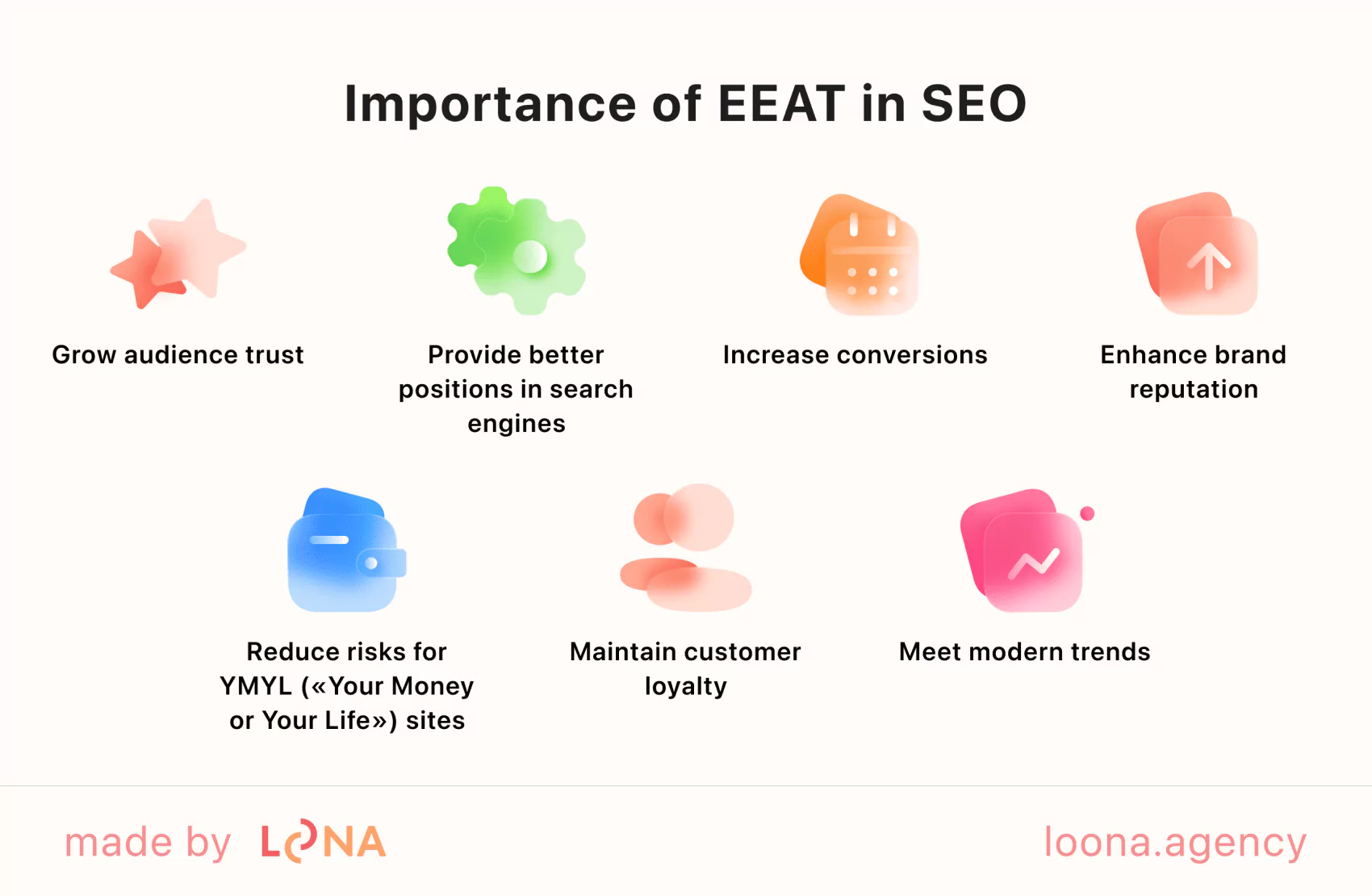
Grow audience trust
The primary objective of EEAT score is to guarantee high quality and reliability of content. When a user sees that the material is written by professional authors with solid knowledge of the topic, this automatically raises the level of trust. Transparency and openness contribute to the formation of a positive brand image, making it a source to which people turn for reliable information.
Provide better positions in search engines
Google created the E-E-A-T vision to boost the quality of search results. Algorithms analyze content, taking into account the experience of the authors, the authority of the source, and the level of trust in the information. If the site satisfies these criteria, it has a better possibility of getting into the first positions of the search results, which increases organic traffic and ensures a stable flow of new visitors.
Increase conversions
Content created by E-E-A-T standards significantly raises the possibility of conversions. Users are more willing to make a decision to leave a request, make a purchase, or order a service if they are confident in the quality and reliability of the information. A professional approach to writing materials helps to better explain why this particular product or service is the best choice.
Enhance brand reputation
High-quality content with strict adherence to the EEAT score helps to form a positive brand image. When the audience regularly sees expert materials, this contributes to the formation of a consistent and holistic image of the company.
Mentions in authoritative sources, high-quality publications, and transparency in interaction with the audience help to consolidate a reputation associated with professionalism and reliability.
Reduce risks for YMYL («Your Money or Your Life») sites
For sites that affect the lives, health, finances, or safety of users, EEAT score is vital. Implementing the concept helps to avoid the spread of false or potentially harmful information. Sites in this category have a better chance of maintaining high positions in search results and protection from sanctions from Google.
Maintain customer loyalty
Users are more likely to return to resources they trust. High-quality content builds trust, which is the basis of long-term relationships with customers. If the site offers helpful and relevant materials, users feel cared about their demands and values, which stimulates their loyalty and willingness to recommend the brand to others.
Meet modern trends
EEAT score is a reflection of modern requirements for digital content. With an emphasis on the experience of authors and an orientation to real user requests, the concept helps to adapt to constant changes in audience behavior and search engine requirements. This method helps businesses to remain competitive even in dynamic market conditions.
Discover also: 15 Effective Public Relations Strategies in 2025 (With Examples & Tactics)
Understanding how E-E-A-T operates
E-E-A-T is a critical part of modern SEO сontent. Search engines, including Google, focus on assessing experience, expertise, authority, and trust to show users the most valuable and reliable resources.
The impact of E-E-A-T on search results
By analyzing EEAT meaning, search engines determine how valuable and relevant a site is for a particular query. A high level of E-E-A-T allows a site to improve its ranking in search engines. Google tries to show users only the most reliable, expert, and authoritative sources.
For instance, suppose someone is searching for information about medical issues. In that case, Google EEAT is likely to give preference to sites that contain materials from doctors or medical institutions, with clear evidence of their qualifications. Therefore, it is vital that the site is useful and demonstrates experience, expertise, and authority in its domain.
How does E-E-A-T change the approach to SEO?
Previously, SEO was more focused on such aspects as keywords, backlinks, metadata, and other technical factors. However, with the advent of EEAT score, search engines began to concentrate more on the quality of SEO content and trust in the resource. This has forced many web admins and content managers to reconsider their strategies.
Focus on quality content
Sites that strive for high results must create detailed, in-depth, and proven content that really helps users.
Focus on authority
To achieve high results, it is necessary to earn authority among other web resources by attracting backlinks from reliable and well-known sources.
Transparency and trust
Disclosure of information about content authors, the presence of security certificates (HTTPS), an honest privacy policy, and user reviews become key to increasing the trust of the site.
How to maintain and improve E-E-A-T?
For your site to meet the Google EEAT guidelines, you need to create high-quality articles and constantly work on increasing authority and trust. Below are some steps that will help you with this:
- Regular content update: Publish new research, update old articles, add new facts and expert opinions.
- Invite experts to collaborate: Network with other experts in your field and involve them in content creation.
- Enhance site security: Keep your site safe for users by ensuring data encryption and protection against malicious attacks.
- Boost user engagement: Regularly engage with your audience through comments, surveys, and feedback, which proves your openness and trustworthiness.
Different levels of E-E-A-T concept
The E-E-A-T level defines how much the content meets the requirements for experience, expertise, authority, and trustworthiness. On the other hand, this level is not always the same for all sites or pages. Let’s take a closer look at them.
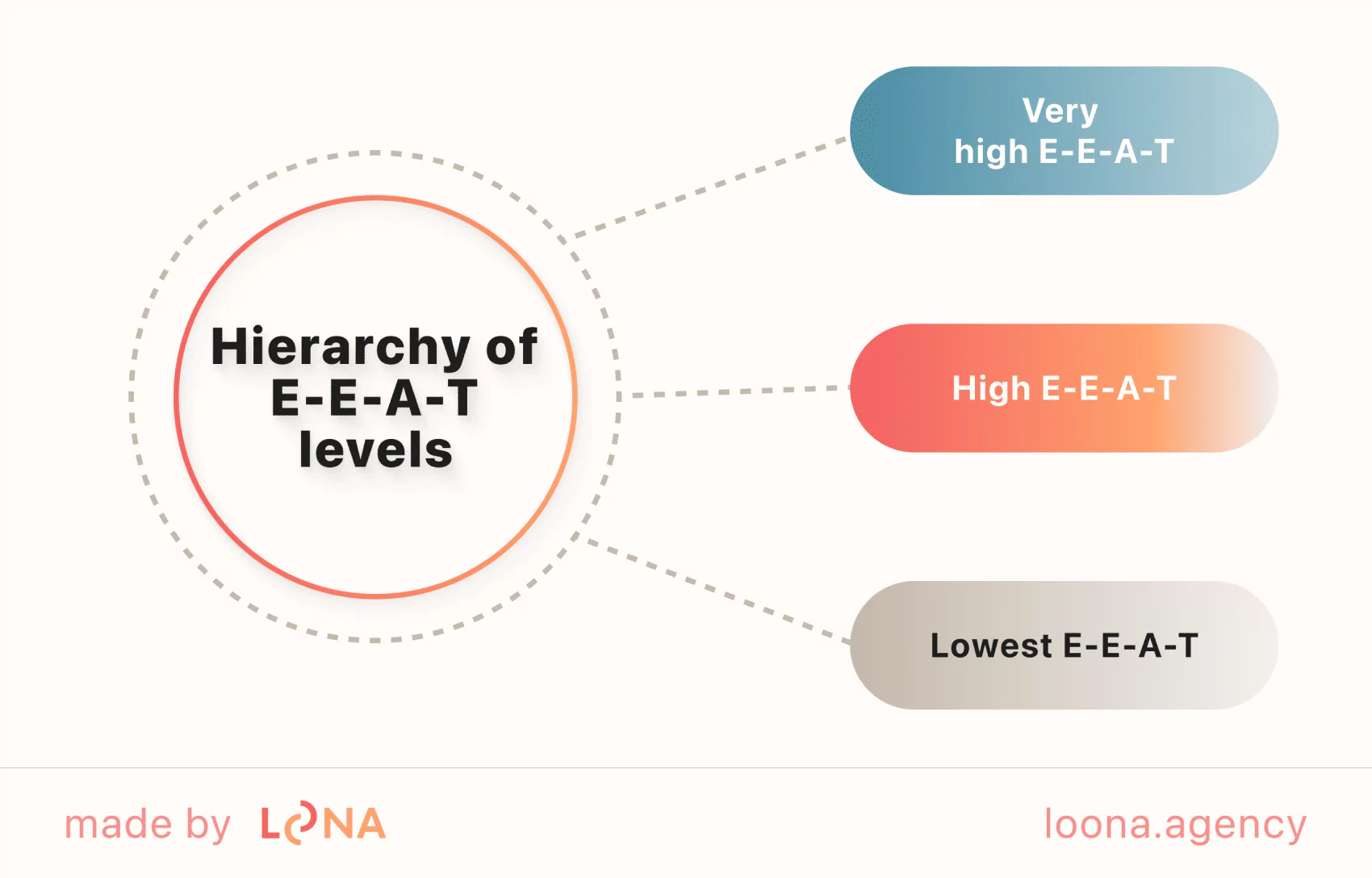
Lowest E-E-A-T
This rank means your site or content does not meet experience, expertise, authority, and trustworthiness criteria. This may result from the content being created by people without the appropriate qualifications or experience in the chosen topic. For instance, a site that provides general health advice without scientific references or medical experts may have a low EEAT score.
In this case, your content may appear superficial or unreliable to users and search engines. The lack of reviews, links to authoritative sources, or expert opinions also lowers your E-E-A-T score. Search engines, including Google, will consider such a site less valuable, and therefore, it will rank low in search results.
High E-E-A-T
For this level, content is usually created by professionals in a particular field with significant experience or qualifications. For instance, a medical blog that publishes articles written by doctors or other medical professionals will be rated as high in E-E-A-T. Reviews from reputable sources and the correctness and accuracy of the information also play an essential role.
In this case, the content will meet high-quality standards: it will be accurate, reliable, and will have links to verified sources. Moreover, the site has a clear idea of its subject, demonstrating high expertise. This allows search engines to evaluate the site as useful for users and rank it highly in search results.
On the other hand, it is vital that experts create content that looks reliable. The presence of reviews, positive ratings from users, links to reputable sources, and certificates or other documents confirming expertise significantly increase the EEAT score.
Very high E-E-A-T
It is the perfect standard that every website strives for. Such sites demonstrate an exceptional level of experience, expertise, authority, and trust. They are created by highly qualified professionals who have significant experience in their field, and their content is of the highest quality.
At this level, a site can have a large amount of content that is actively updated and numerous backlinks from authoritative sources. A very high EEAT score is also characterized by the presence of articles highly rated in scientific or professional circles and a high level of interaction with users.
2025 best practices to boost E-E-A-T SEO
As Google EEAT guidelines continue to expand, it’s vital to understand and employ top techniques to boost your site’s E-E-A-T. This will allow you to raise the quality of your content, build brand authority, and gain user trust. Below, we’ll analyze essential strategies for improving E-E-A-T that you can implement in 2025.
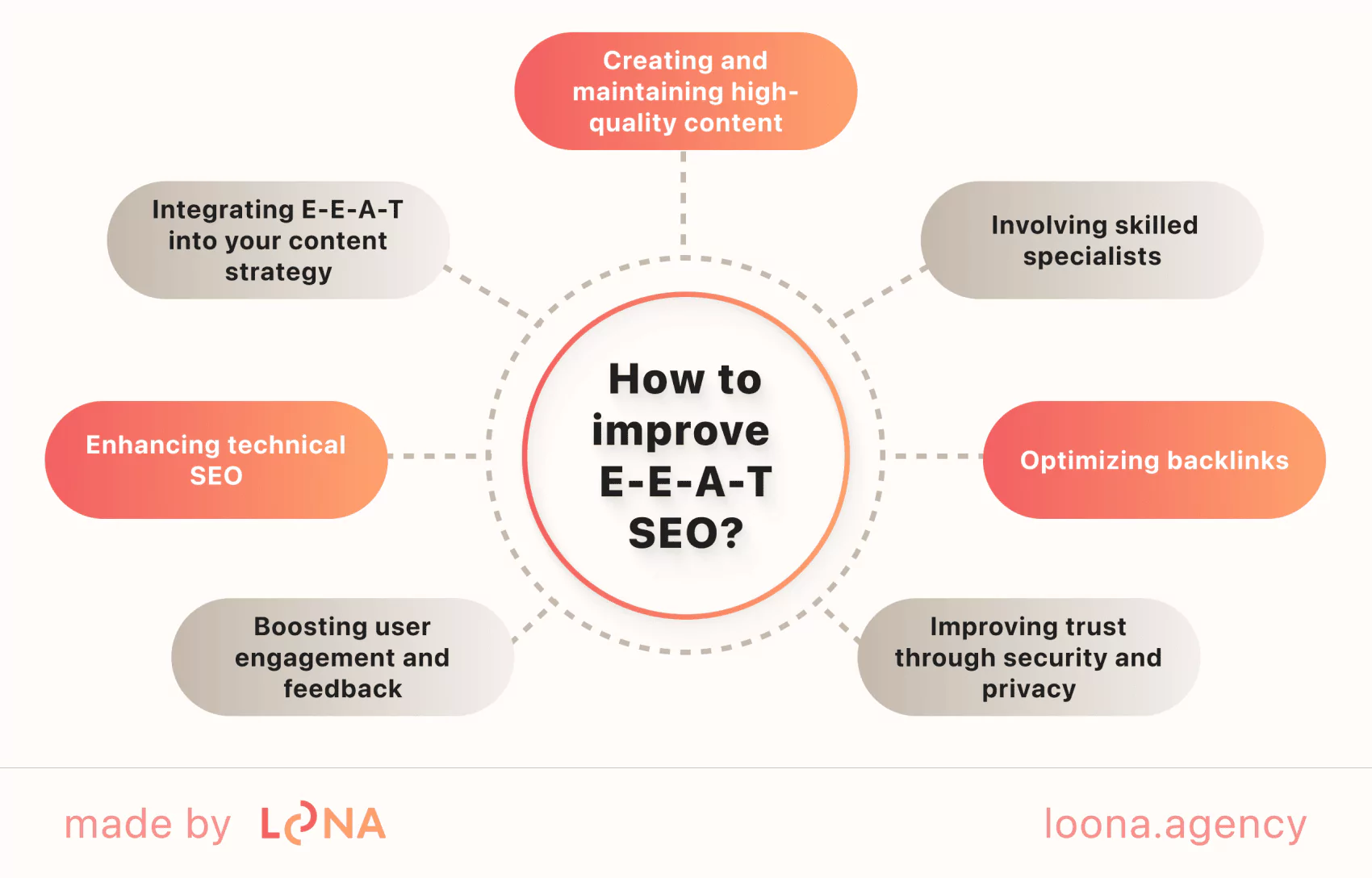
1. Creating and maintaining high-quality content
In fact, content remains the basis of all SEO. To rank high on Google and enhance your site’s E-E-A-T, you need to create content that answers user queries and proves your expertise, knowledge, and authority in your industry.
- Deep dive: Your content should be more than just a superficial overview. Research topics in depth, provide detailed information, and back up all claims with reliable sources. It’s essential to give users full context and reveal all the nuances of the topic.
- Interactive content: Besides articles, you should produce other content formats, such as videos, infographics, expert interviews, or podcasts. This will make your information more accessible and interesting.
- Relevance and update: As the Internet changes rapidly, old content can lose its relevance. Update your materials regularly, adding new facts, research, and solutions to new problems.
Discover also: How Much Does Local SEO Cost?
2. Involving skilled specialists
One of the critical factors in growing your expertise and authority is to involve professionals in your domain in creating content. If your site has quality-written articles, this will significantly boost your EEAT score.
Including quotes, interviews, or articles written by experts in your field helps take your content to the next level. If you’re creating content on a medical or financial topic, involving doctors, financial advisors, or other professionals is a must.
It’s important to show who’s writing your content and provide information about the author’s qualifications. Write a short biography of the author of the article, indicating their experience and achievements in the industry.
3. Optimizing backlinks
They remain among the most critical factors affecting your site’s authority. In 2025, Google will pay even more attention to whether your site is linked to other authoritative sources.
It’s much more important to have a few links from large and authoritative resources than hundreds from little-known sites. Focus on building partnerships with leading brands or media outlets to get high-quality links.
It is important to deliver content that other sites will want to link to. This could be in-depth research, statistics, analytics, or useful resources that can be a source for other posts.
Also, it is necessary to regularly check which links point to your site and ensure they meet high-quality standards.
4. Improving trust through security and privacy
Trust is an engine of EEAT score. Google takes into account how safe your site is for users, as well as how well you protect their personal data.
- SSL certificate (HTTPS): Having an SSL certificate has become the standard. If your site does not use HTTPS, it can negatively affect your search engine rankings.
- Transparency and privacy policy: Make sure your site has a clear privacy policy and other documents that explain how you collect and use user data.
- No malware: Check your site for malware or ads, as this can seriously damage your reputation.
5. Boosting user engagement and feedback
User behavior on your site is an essential signal to search engines. The more users interact with your content, the more likely Google will rate your site as high-quality and authoritative. It is important that your site is easy to use. An intuitive interface and easy navigation will help users find the information they need faster.
Encourage users to leave reviews and comments, this improves the trustworthiness of your site and shows that you are actively engaging with your audience.
Search engines take into account whether your site is mobile-friendly. As more and more people use mobile devices to search, mobile-friendly optimization is critical.
6. Enhancing technical SEO
Technical SEO is the basis for enhancing the quality of your site and ensuring it meets the highest EEAT guidelines.
Loading speed is one of the fundamental components that affects search engine rankings. Ensure your site loads quickly by optimizing images, caching, and other methods to speed things up.
Make sure your URLs are clear and understandable, and meta data such as titles and descriptions are relevant to the page content and include relevant keywords.
7. Integrating E-E-A-T into your content strategy
Delivering high-quality content should be the heart of your EEAT in SEO strategy. It is vital that content is created according to E-E-A-T criteria and that each piece of content is thoughtfully designed to attract the attention of both users and search engines.
It is a great idea to develop a content plan based on current user queries and industry trends. Include a variety of formats and topics that can increase your brand’s expertise and authority.
All content you publish must meet high-quality standards and accurately convey information. You should pay special attention to grammar, facts, and sources.
Discover also: The Power of SEM Tools for Digital Marketing
What happens when you ignore EEAT?
Every factor matters in SEO and digital EEAT marketing. So, ignoring the E-E-A-T concept can cause low search engine rankings and slow down your brand’s growth. If you don’t employ the factors below in your marketing strategy, the consequences can be serious.
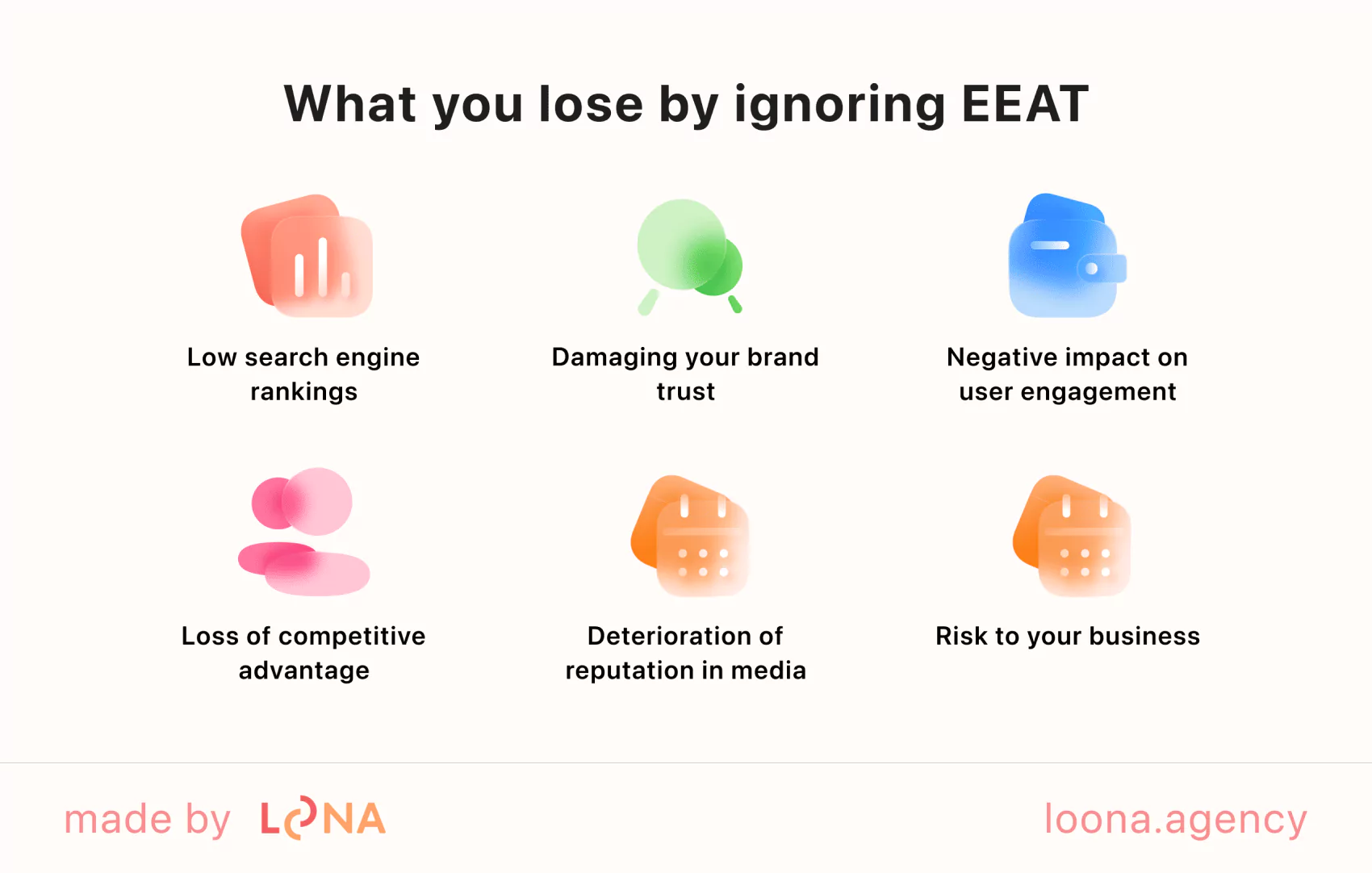
Low search engine rankings
One of the most apparent effects of ignoring EEAT score is your website’s low rankings in search engines, especially Google. As Google increasingly concentrates on content quality and source reliability, sites that don’t meet E-E-A-T standards risk being left in the shadows of search results.
Google utilizes various algorithms to rank websites based on the E-E-A-T principles. If your site doesn’t demonstrate experience, expertise, authoritativeness, and trustworthiness, it’s likely that it won’t be able to rank high for competitive queries. This can lead to reduced traffic and potentially lost business opportunities.
Damaging your brand trust
EEAT score is directly related to trust. Ignoring these guides can seriously impact your brand trust. Users who find your site through search engines don’t have the ability to verify whether your company is trustworthy or reputable physically. However, they may notice certain signs that indicate a lack of authority or trust, such as:
- Lack of qualifications for article authors or experts;
- Low-quality content without specific sources or evidence;
- Lack of security on the site (recently updated SSL certificate);
- Negative reviews or no reviews at all.
If users notice that your site looks unreliable or unprofessional, they may decide not to use your services or products, even if your offer looks good.
Negative impact on user engagement
When your site does not have a high level of E-E-A-T, users are likely not to interact with your content as actively as they would like. Search engines evaluate the content quality and users’ interaction with it. If users do not leave reviews, do not follow links, or do not return to your site, this can be a signal to search engines that your content is not useful or reliable enough.
Low levels of engagement can cause search engines to lower your site in the ranking, which again will have negative consequences for your SEO content EEAT and business.
Loss of competitive advantage
Ignoring the E-E-A-T regulations can give your competitors who are actively working to enhance these elements a significant advantage. Search engines favor sites that have high levels of EEAT score. If your competitors can demonstrate expertise, experience, and authority in their industry, they will be more likely to appear in the top positions in search engines.
As a result, your business may lose potential customers who find your competitors through search engines. Moreover, competing sites that provide accurate and verified data can earn user loyalty, leading to long-term benefits.
Deterioration of reputation in media
Google also considers the authority of a site through backlinks. If other high-quality and authoritative sites are not linking to your content, this may indicate that your site does not have sufficient authority. Ignoring E-E-A-T can lead to your site not receiving external links or citations from other sources, which will decrease its authority.
The lack of backlinks from other authoritative resources can also mean that your reputation on the Internet is not reliable. If other sites are not willing to point to your content, this can have serious consequences for your EEAT in SEO and the trust in your brand.
Risk to your business
Neglecting E-E-A-T has an impact on SEO and your entire business as a whole. A lack of trust in your content and your site can lead to lower conversions, loss of customers, and, ultimately, reduced revenue. If your business does not adhere to E-E-A-T standards, potential customers may choose competitors who have a better online reputation and provide more authoritative and reliable information.
In the case of e-commerce or any other online service where customers trust you with the security of their data or purchases, having a high level of trust and security is basic. Ignoring EEAT score can lead to severe financial losses and loss of customer loyalty.
Enhance E-E-A-T with the Loona SEO team
At Loona marketing agency, our expert SEO services cover different industry sectors and adapt to the various requirements of each business type. Our skilled team optimizes your website and helps you strengthen long-term relationships with your target audience.
One of our valued clients is Peiko, a premier blockchain development company specializing in advanced web and mobile solutions. Our team helped our client improve their digital presence and expand their global reach in highly competitive markets through strategic SEO, content marketing, link-building, keyword research, and more.
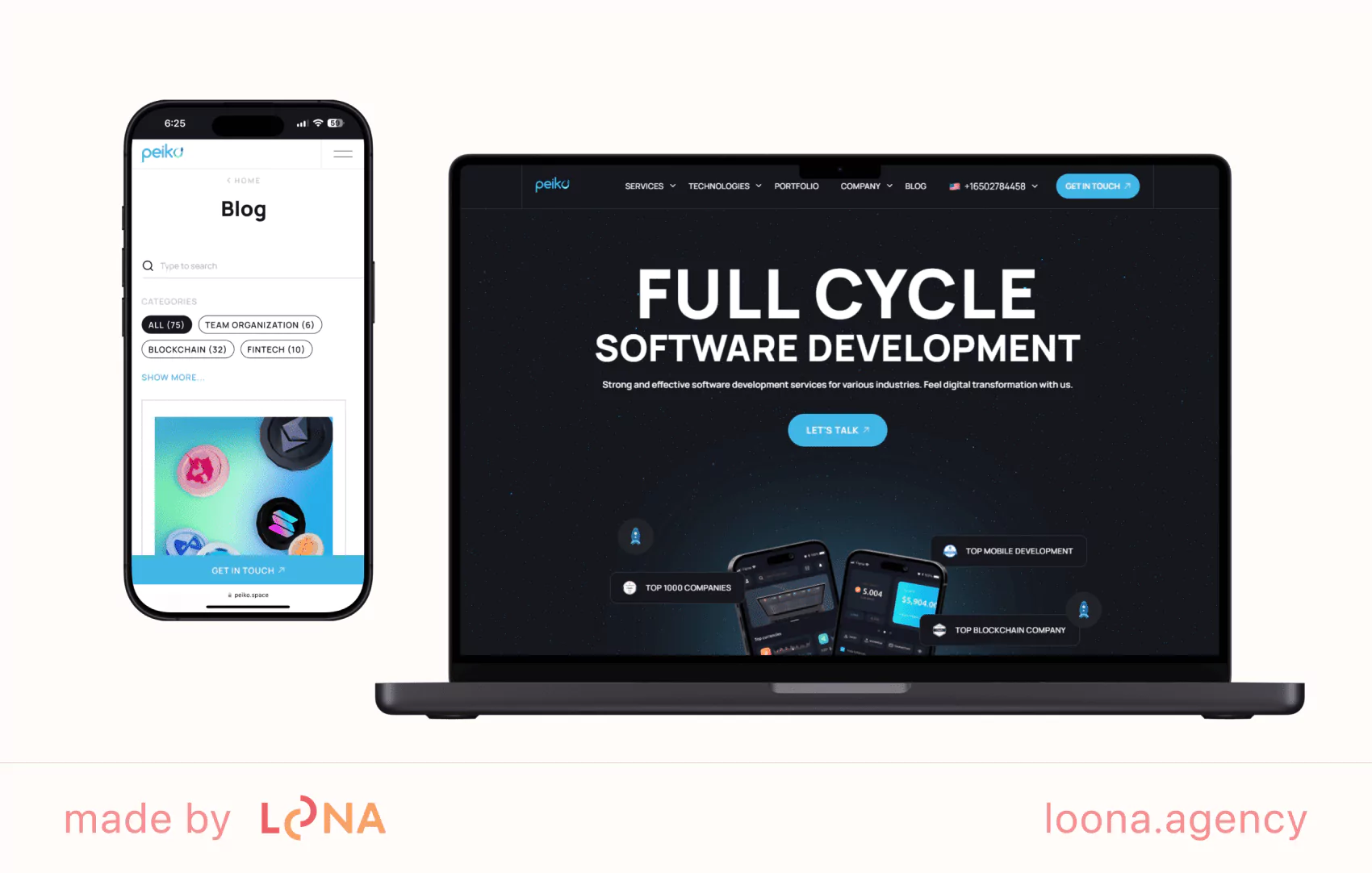
Client pain points:
- Irrelevant traffic from non-target countries;
- Outdated and overly complex website;
- Spammy backlinks with low relevance;
- No lead tracking, CRM (customer relationship management), or effective sales communication;
- Unregulated niche with no clear benchmarks;
- Weak content and SEO strategy.
Our outstanding results:
Our specialists doubled the volume of valuable website content, which resulted in a 4x boost in leads from organic search, with 40% being qualified for conversion. These efforts raised visibility, attracted targeted traffic, and significantly enhanced conversion rates. We continue to support their growth with ongoing services.
Final thoughts
There is a perception that E-E-A-T is just a set of criteria from Google. Regarding EEAT meaning, it is an essential strategy for creating high-quality, practical, and reliable content that satisfies the expectations of the targeted audience. By employing the principles of expertise, experience, authority, and trustworthiness, you will boost your site’s visibility and build trust among readers.
These days, information is available everywhere. It is a great idea to stand out not only in terms of quantity but also in terms of quality.
Do you want your content to meet the highest standards? Our marketing agency will help you create a strategy that will bring remarkable results. Contact us to deliver magical content together. Сheck out our portfolio to see how we helped businesses across various industries thrive.
FAQ
01 What is the difference between EAT and E-E-A-T?
E-E-A-T stands for expertise, authoritativeness, and trustworthiness, which Google uses to assess the credibility of a website. In 2022, Google expanded this concept to E-E-A-T by adding experience as a fourth pillar. Experience refers to practical engagement with the subject matter.
02 What is the E-E-A-T score?
The E-E-A-T score is an informal term used by SEO experts to describe how well a website aligns with Google's criteria for experience, expertise, authoritativeness, and trustworthiness. Although Google doesn't use a numerical E-E-A-T score, its quality raters evaluate content based on these factors.
03 Is E-E-A-T still important?
Yes, E-E-A-T remains crucial for improving online visibility and building trust with users and search engines. Adhering to E-E-A-T principles can enhance your rankings, attract more visitors, and foster long-term trust.
04 How to boost E-E-A-T?
To improve your E-E-A-T, follow these key strategies: showcasing experience, demonstrating expertise, building authoritativeness, enhancing trustworthiness, and keeping content updated.
05 What is E-E-A-T for content writing?
Writers should focus on delivering well-researched and insightful content. Incorporating real-life examples, citing credible sources, and ensuring factual accuracy are vital for building trust. Also, author bios showcasing qualifications and experience can further establish the writer's credibility.
Love what you’re reading? Sign up for our newsletter to get our newest articles, helpful tips, and fresh marketing updates delivered right to you. No spam, just the good stuff.











